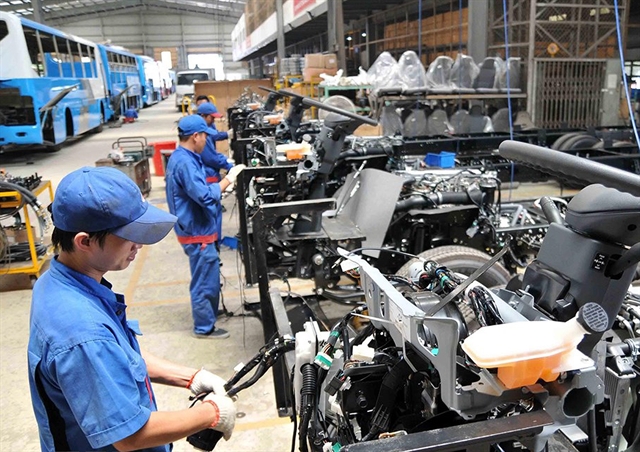 Economy
Economy


|
| Assembling cars at Saigon Transportation Mechanical Corporation (Samco). — VNA/ VNS Photo |
The import value serving Việt Nam's production activities accounts for more than 80 per cent of the total import turnover every year, so experts are clear - supporting industries have not yet fully developed, causing Việt Nam's production to still depend heavily on the international market.
A recent report of the Ministry of Industry and Trade (MoIT) shows that the number of enterprises in the supporting industry sector accounts for a minimal share, only about 4.5 per cent of the total number of companies in the manufacturing and processing industry.
These enterprises are mainly foreign-invested ones, but the goals of these entities are mainly aimed at the export market.
Raising the issue of how Việt Nam can enhance its autonomy in production in the face of the volatile world economy and improve its position in the global production chain, experts said that the country needed to localise a number of supporting industries. They could then exploit domestic raw materials and fuel sources to promote internal strength and stimulate the development of manufacturing industries, contributing to increase the added value of the economy.
Việt Nam has set a goal that, by 2025 local enterprises will be able to produce highly competitive supporting industrial products, meeting 45 per cent of essential needs for domestic production and consumption, accounting for about 11 per cent of the total industrial production value.
There will be about a thousand companies with the capacity to directly supply to assembly enterprises and multinational corporations in Việt Nam, of which domestic enterprises make up about 30 per cent.
By 2030 supporting industrial products will meet 70 per cent of the demand for domestic production and consumption, accounting for about 14 per cent of industrial production value.
There will be about 2,000 enterprises with the capacity to directly supply to assembly enterprises and multinational corporations in Việt Nam.
Economic experts say that supporting industries play an important role in attracting FDI investment.
In addition, they promote the development of domestic industries, creating competitive export products with high-added value and developing the domestic market, contributing to improve national competitiveness and ensuring sustainable economic development.
The Kiểm toán (the Auditing online newspaper) quoted a representative of the MoIT’s Department of Industry as saying that despite its important role, the development scale of supporting industries in Việt Nam was still limited.
In addition to high imports of products, raw materials as inputs for production, production activities of supporting industries were also concentrated on a small scale.
This was one of the reasons why the added value of supporting industries was at the lowest level in the economy, he said.
Although it was an industry sector that supported the development of other industries, its efficiency was not high, he said.
However, Nguyễn Thị Hương, head of the General Statistics Office (GSO), said that Việt Nam was still considered a country with certain advantages in attracting FDI such as political stability and a large population with a high proportion of working age.
Along with that, the processing and manufacturing industry was also a field that the Vietnamese Government was very interested in, prioritising finding investment, aiming to achieve the goal of becoming a modern industrialised country by 2030.
Although the domestic context creates many advantages, the development of supporting industries also faces many difficulties.
In addition to inherent difficulties such as lack of capital, high-quality human resources, raw materials, supporting industry enterprises are increasingly under pressure in terms of waste treatment issues.
Labour productivity of Vietnamese workers is still low, while labour costs are showing signs of increasing, leading to increased product prices.
Vocational training is not suitable for the development requirements of the industry, which reduces the competitiveness of industrial products.
Furthermore, experts said that the development of Việt Nam's supporting industries would be affected by many factors, notably the increasingly deep international integration, the signing of many free trade agreements (FTAs) and the rapid pace of the 4.0 industrial revolution.
These factors had created both opportunities and challenges for the development of supporting industries, said experts.
To realise the set orientations and goals, experts recommended that, in addition to continuing to perfect effective mechanisms and policies, it was necessary to continue implementing preferential interest rate policies for supporting industry enterprises, priority processing and manufacturing industries.
It is also necessary to subsidize interest rate differences for loans, to produce products in the list of priority supporting industrial products for development using capital from the central budget, local budgets, ODA capital, and foreign preferential loans. VNS




